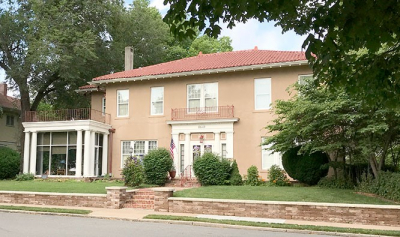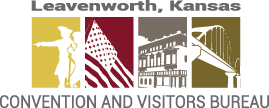Leavenworth Hosts Pioneering Women's Election-Day Campaign
By Bernadette Cahill
On Election Day in 1867, Leavenworth’s voters saw something startling: two women touring every precinct and asking for votes.
The event was so odd because women at the time could not vote and never went near those rowdy, drunken dens of polling and political intrigue.
But that November 5 was very different: the two women, Susan B. Anthony and Elizabeth Cady Stanton, were the nation’s leading advocates of equal voting rights; and Kansas – for the first time ever anywhere in the United States – was holding a referendum on expanding voting rights to women.
At that point, only white male Kansans could vote. In January, 1867, however, the governor had proposed a referendum to extend votes to black men to ensure that the 14th Amendment could not penalize Kansas by reducing the number of white male voters by the number of black men denied votes.
Then, some legislators had decided to try to extend voting rights to women as well. After a contentious debate, referenda for black males and all women were put on the ballot for November.
Leavenworth had long been home to Daniel R. Anthony, the younger brother of Susan. Two years before, in 1865, staying with him at 515 North Esplanade Street, she worked on his newspaper and – separately – promoted post-war equal rights when abolition was approaching. During her 6-month stay, she spoke publicly in Leavenworth, Topeka, Lawrence and Ottumwa.
In spring, 1867, with the referenda for black males and all women on the horizon, eastern equal rights worker Lucy Stone launched a campaign and spoke in Leavenworth in early April in favor of both measures. During the summer, the Rev. Olympia Brown and Miss Bessie Bisbee toured endlessly promoting equal suffrage.
Anthony and Stanton arrived September 2, remaining until after the vote. Stanton campaigned around the state with former Governor Robinson. Anthony, with no man to accompany her, headquartered the campaign in Lawrence, organized rallies elsewhere, printed and shipped flyers and tracts, and begged for funds and votes wherever possible.
Early on, equal voting rights looked as if it might pass. But soon the female suffrage supporters found that state and national Republicans and Democrats, black men, churchmen, and many newspapers were against them. Even Daniel Anthony wobbled.
Democrat George Francis Train arrived to help during the last two weeks of the campaign. Launching the final election push in Laing’s Hall on October 21 here in Leavenworth, Susan spoke for equal suffrage and Train spoke for women. Then they campaigned together in tiny towns in mostly empty and inhospitable country until early November.
The Sunday before the vote, Daniel entertained Susan and Train at his home. On November 4, all the campaigners met up in Leavenworth and on November 5, “Mrs. Elizabeth Cady Stanton and Susan B. Anthony … visited the polls in each ward of Leavenworth … in carriages and addressed the voters…” reported the Daily Kansas Tribune of Lawrence. Such women’s work was “probably the first … in this country,” the newspaper said, “[and] all were received at every precinct with hearty cheers for woman’s rights and female suffrage.” A well-known singing group, the Hutchinsons, entertained the electors and onlookers.
Departing for Kansas, Stanton had said, “I am going to hunt the ‘white male’ citizen out of that region.” After the vicious campaign, both referenda were defeated and the white male citizen remained supreme.
The 14th and 15th Amendments in 1868 and 1870 gave black men the right to vote. Kansas women won the right to vote in 1912. Women across the United States won the right to vote in 1920 – 53 years after Leavenworth played a key role in the campaign for the first referendum in any state to end discrimination in voting against women.
Bernadette Cahill is the author of Alice Paul, the National Woman's Party and the Vote: the First Civil Rights Struggle of the 20th Century, (Jefferson, North Carolina: McFarland, 2015) and Arkansas Women and the Right to Vote: The Little Rock Campaigns 1868-1920 (Little Rock, Arkansas, 2015). Her latest book, No Vote for Women:The Denial of Suffrage in Reconstruction America, (McFarland), will appear soon.



